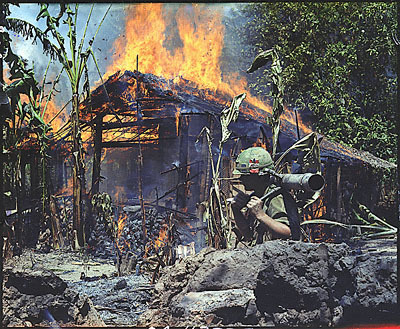http://www.google.com/images?q=vietnam+war+memorial&oe=utf-8&rls=org.mozilla:en-US:official&client=firefox-a&um=1&ie=UTF-8&source=univ&sa=X&ei=P8JhTd-QDYe-sQOA9cjDCA&ved=0CGgQsAQ&biw=1024&bih=565
My Tho, Vietnam. A Viet Cong base camp being destroyed. In the
foreground is Private First Class Raymond Rumpa, St Paul, Minnesota, C
Company,
3rd Battalion, 47th Infantry, 9th Infantry Division, with 45 pound 90mm
recoiless rifle. 04/05/1968
The Things They Carried
"The Things They Carried" is an extremely understated title. Whereas other war novels blandly plod through checklists of items used by soldiers, and offer detail of battles fought, Tim O'Brien's story presents the intangible hopes, demons, fears, and horrors that were carried, but could not be weighed. The way he blends in these intangible burdens, as he runs through the checklist of death and destruction that each man carried, is literary genius. The approach taken in this story gives the reader the ability to visualize the grisly task assigned to these soldiers, as well as insight into the emotional trauma reaped by carrying out such tasks.
The Vietnam War was a dark time in American history. Like many atrocities, people tend to push it away, or not speak of it. This story doesn't push it away, but instead places it under a microscope. The very cells and molecules that make up the beast of war are examined. This story is not of war; nor is it of those who participated in it. It is a story of what makes those men continue; of what makes them live; of what makes them men. In order to understand war, you must first understand the battles. In order to understand the battles, you first must understand the men in battle. In order to understand the men, you must look deep inside them. I applaud Mr. O'Brien for taking us in deep; deeper than we may be comfortable with sitting in our middle class homes, but deep enough to reach a fuller, deeper, more appreciative understanding of the things they carried.

No comments:
Post a Comment